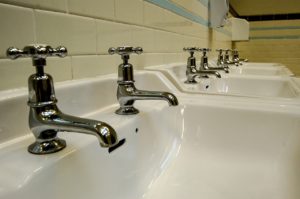Care home operators must take action to prevent outbreaks of Legionella in their establishments, the Water Hygiene Centre has warned.
 In an online blog post, Philip Lonsdale highlights the numerous risks that can be involved with running a care home, including vulnerable residents, waterborne pathogens and scalding by hot water.
In an online blog post, Philip Lonsdale highlights the numerous risks that can be involved with running a care home, including vulnerable residents, waterborne pathogens and scalding by hot water.
In particular, Mr Lonsdale adds that older people with underlying health problems can be more susceptible to Legionnaires’ disease and other waterborne pathogens and that the bigger and more complex water systems, which are often found in care homes are more difficult to keep under control and represent a greater potential for problems.
In his article, Mr Lonsdale quotes the HSE’s Approved Code of Practice [ACOP] L8, which states that care homes should appoint a manager to be responsible for others, carry out risk assessments and implement, manage and monitor any precautions.
“It is the risk assessment that identifies the level of risk and therefore informs the written scheme and the control measures defined within it,” writes Mr Lonsdale.
“The assembly of a competent risk assessment team is therefore of paramount importance. The team should comprise both care professionals and water hygiene specialists to understand not only water system installation but also the operational requirements and user profile.”
And he quotes a case originally reported by SHP Online in August 2009, when a water treatment company was prosecuted for providing inadequate risk assessments to care homes in Wales.
In November 2007 the HSE was notified that an employee at Woffington Care Home in Blaenau Gwent, South Wales, had been admitted to hospital with Legionnaires’ disease. An HSE inspector visited his workplace and took samples of the water to test for the bacteria.
Although the results showed that there was no legionella present in the water, the inspector was concerned that the home, which was managed by Craegmoor Healthcare, didn’t have adequate controls in place to manage the threat of the bacteria.
Subsequently, the inspector visited three other nursing homes managed by the same firm and identified inadequate controls for legionella at each premises.
During the investigation it was discovered that DEBA UK Ltd had been commissioned to carry out a legionella surveys at each of the nursing homes and had rated each property as having a low risk of containing the bacteria. But there was no evidence that the firm had taken regular temperature readings from the water systems to ensure that the storage temperature was above 60oC.
It also failed to take any readings from the storage and distribution points in the system, and instead recorded the temperature at exit points.
What makes us susceptible to burnout?
In this episode of the Safety & Health Podcast, ‘Burnout, stress and being human’, Heather Beach is joined by Stacy Thomson to discuss burnout, perfectionism and how to deal with burnout as an individual, as management and as an organisation.
We provide an insight on how to tackle burnout and why mental health is such a taboo subject, particularly in the workplace.

 In an
In an 